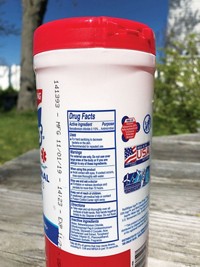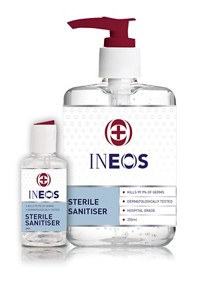Advertisement
Grab your lab coat. Let's get started
Welcome!
Welcome!
Create an account below to get 6 C&EN articles per month, receive newsletters and more - all free.
It seems this is your first time logging in online. Please enter the following information to continue.
As an ACS member you automatically get access to this site. All we need is few more details to create your reading experience.
Not you? Sign in with a different account.
Not you? Sign in with a different account.
ERROR 1
ERROR 1
ERROR 2
ERROR 2
ERROR 2
ERROR 2
ERROR 2
Password and Confirm password must match.
If you have an ACS member number, please enter it here so we can link this account to your membership. (optional)
ERROR 2
ACS values your privacy. By submitting your information, you are gaining access to C&EN and subscribing to our weekly newsletter. We use the information you provide to make your reading experience better, and we will never sell your data to third party members.
Consumer Products
Covid-19
Stepping up to the hand sanitizer shortage
Chemical companies, breweries, and perfumeries take to making and donating a vital commodity in short supply
by Melody M. Bomgardner , Rick Mullin , Alex Scott
March 19, 2020
| A version of this story appeared in
Volume 98, Issue 11

About 6 weeks ago, the pharmaceutical chemical maker Hovione ran out of disinfectant gel at its plant in Macau. “So the guys just used their heads and started manufacturing it themselves,” CEO Guy Villax says.
Hovione is one of a number of chemical, distilling, and other companies that are starting or increasing production of hand sanitizers and sanitizer ingredients needed during the coronavirus pandemic. Some are already in the sanitizer business. Others, like Hovione, jumped in during a time of need.
Impressed by the initiative in Macau, Villax put staff at the company’s plant in Loures, Portugal, to work making alcohol-based sanitizer at metric-ton scale. Hovione is distributing it to hospitals, other health-care facilities, and municipalities in solution and gel formulations.
Support nonprofit science journalism
C&EN has made this story and all of its coverage of the coronavirus epidemic freely available during the outbreak to keep the public informed. To support us:
Donate Join Subscribe
Hovione has enlisted a dedicated production line in Loures staffed by a team of about 30 workers. The company is using a formula available from the World Health Organization involving mainly ethanol or isopropyl alcohol and glycerin. Production volume was expected to reach 5 metric tons (t) during the week of March 16 and as much as 30 t by the following week.
“At the moment we have hospitals asking us for 6 to 10 t, small entities asking for 100 L,” says Filipe Neves, pilot plant operations director, who is overseeing the project for Hovione in Loures.
In Germany, the big chemical maker BASF says it is preparing to manufacture hand sanitizer at its headquarters complex in Ludwigshafen, where it makes raw materials for sanitizers. The company plans to distribute the product to area hospitals.
UK-based Psychopomp & Circumstance Distillery, which normally distills gins and rums, is using its still to make sanitizing hand gel that it is giving away. Consumers can top up their own refillable bottles at the firm’s still in Bristol and leave a donation for a local children’s hospital.
The company started out mixing its alcohol with aloe vera gel but has since switched to glycerin. “We are making as much of it as we can without going bankrupt,” Psychopomp cofounder Liam Hirt says.
Ireland-based Listoke Distillery has also switched production from gins to alcohol for hand gels, as have Taiwan Tobacco and Liquor and a number of small US distillers.
The flavor and fragrance producer Firmenich has shifted production at its La Plaine, Switzerland, facility to disinfectant solution. LVMH, the parent company of luxury goods maker Luis Vuitton, has switched three of its perfume facilities in France to making “substantial quantities” of alcohol-based hand sanitizer. The firm is giving the product to the French health authorities for free.
Specialty chemical manufacturers in the business of making sanitizing and disinfecting chemicals are boosting production. Lanxess is significantly increasing output of its Virkon sanitizer in Sudbury, England—introducing a second shift. The company recently donated a metric ton of disinfectant to hospitals in Wuhan, China, the epicenter of the virus outbreak, and to nearby cities.
And Gelest has significantly ramped up production of its Biosafe antimicrobial agent at its facility in Morrisville, Pennsylvania. Based on silane quaternary ammonium salts, Biosafe punctures the cell membranes of microbes, destroying them on contact. Applications include formulations used by food service workers.
Biosafe is also the microbe-killing ingredient in a laundry additive called Certainty Smartboost, from the uniform company Careismatic Brands, which is sold primarily to health-care workers in specialty stores near hospitals. Workers use the treatment on their hospital scrubs or uniforms because it provides antimicrobial protection after they are washed.
Drums of Biosafe are “flying off the shelves” to formulators of cleaning products, including nonwoven wipes, according to Gelest CEO Ken Gayer. “We’re now also seeing direct orders from hospitals that want cases and cases of this material and are giving it to staff members.”
CORRECTION
This story was updated on March 23, 2020, to correct the spelling of the hand sanitizer brand Virkon. It was originally misspelled "Vikron."




Join the conversation
Contact the reporter
Submit a Letter to the Editor for publication
Engage with us on Twitter